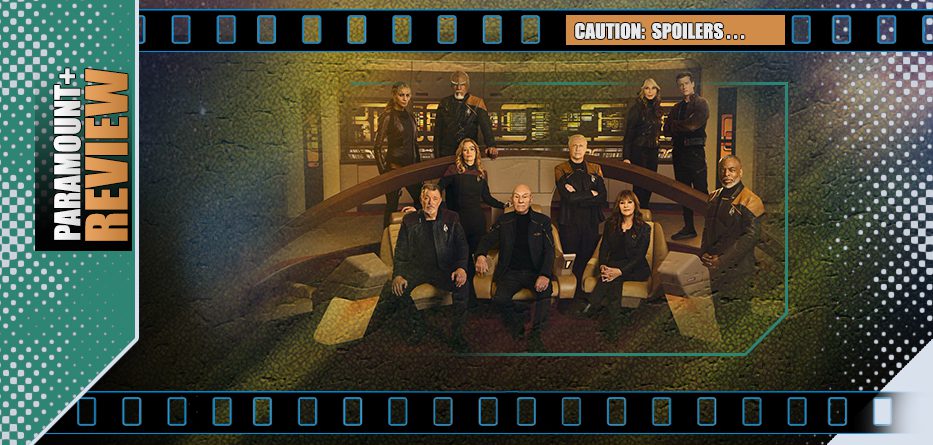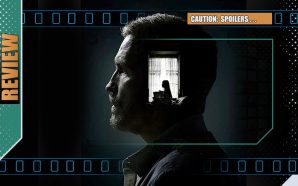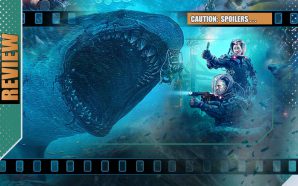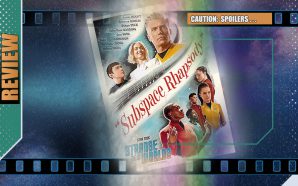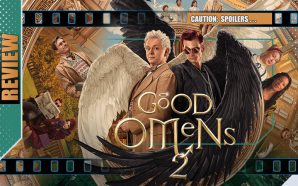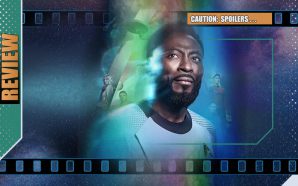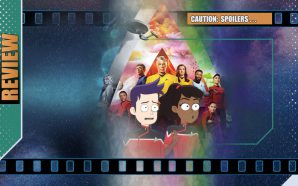The attack on Earth has begun with almost every ship in Starfleet now under the control of the Borg. As the skeleton crew of the Enterprise-D rush home, they realise that the only chance of preventing complete assimilation is to strike at the heart of the Borg cube that seems to be commanding the initiative.
But when it’s revealed that Jack Crusher is the voice acting as a transmitter and beacon for the plan, Picard is faced with a hard choice – to save all of humanity, will he be willing to sacrifice his son?
There seems little chance of survival, but even if the battle can be won, what will become of this last generation or the next?
*spoilers*
There are two ways to evaluate the finale for Picard‘s Season Three. One is in its own right as a closing episode of a season-long arc, the other is as the parting shot of an ongoing voyage that’s lasted over three decades.
Perhaps it’s better to start with the latter first and in that sense it’s hard to imagine a better unashamed love-letter to the fans and the very people who did the impossible and took over the mantle from TOS (The Original Series) and made TNG (The Next Generation) just as culturally important to its televisual audience and beyond three decades ago. With a 2023 series that has set its pentameter to the nostalgic beat of older fans across the spectrum, this was the season such fans had been waiting for: a course-correction to the two previous seasons of Picard – which had been well-intentioned but narratively a mess – and so produce something akin to an eighth, more seasoned season of that Next Generation story.
This run’s secret ingredient has been that it wasn’t afraid to show its classic ensemble finally aging. These are the characters we know and love but they’re no longer the spritely frontier force, boldly going to strange new worlds on a weekly primetime basis – they’re the elder statesmen, full of triumphs and regrets, assessing their legacy and relevance. There’s a call to battle (the universe always needs saving), but there was no squeezing into the same uniforms nor jumping over polysterene boulders in a single bound sponsored by Voltaren – no, this was a story about the age of heroes in a far more literal sense and which it embraced with bravura pride. This last episode, The Last Generation, opens up with a tweaked branding intro (now with TNG Enterprise, Borg Cube and red laser gunsight) and never lets up until the final credits roll.
In particular, this season Patrick Stewart has given us a more weathered Picard, genuinely chastened by past decisions and fault-lines… less of a leader and more as a combatant. The Captain turned Admiral still cuts an austere figure, imposing in his moments and profile, but also one that doesn’t stand (physically or metaphorically) quite as tall as he used to. This season his decisions have been consistently questionable, the results mixed and the loyalty he commands has been trading on his reputation. By the time we’re done here and he faces down the Borg Queen (venturing into what we’ll call the cybermindscape – only because the ‘Matrix‘, however visually similar, is trademarked) to save Jack, we do see a changed Picard. At the start of the episode, ever the strategist pragmatist, he acknowledges that the needs of the many must outweigh the needs of the one, but by its end, he’s less a captain and more of a father who will now sacrifice everything for his son. Risking becoming Locutus again is surely Picard’s lifelong worst nightmare and yet he faces it willingly and bravely to save his son.
Niggles? When it comes to the second barometer, this isn’t the best ending for a story that was, at the start, quite a different and darker hue of nostalgia. Look closer and a lot doesn’t make real sense and amid the engaging personal stories and high-stakes, some early elements feel squandered in a sharp flourish of the brush into Borg cubism. The explanation of the Borg/Changeling alliance – a singular epic idea in and of itself that could have been the main pivot of the season – is pushed aside as a mere footnote to get us to a sparkly and shiny but frankly been-there-done-that type of space battle. The action sequences are done well, but they too feel nostalgic more than cutting-edge and much of the series’ tension is swapped for more overt and in-your-face heroics. There are a few key moments that almost feel as if they came from other franchises. The turning Earth’s defences against itself was a key part of Babylon 5‘s best season, the Enterprise speeding through the innards of the Borg Cube (a pretty decent VFX sequence that would have been beyond the 1980s era) felt akin to the Millennium Falcon escaping the second Death Star and I swear just for a second I wondered if Picard’s parting words on the bridge were going to be ‘May the Force be with You..‘
We’re meant to believe that Jack’s pull towards the Borg is coincidental to their plans for Frontier Day (or perhaps vital, but relying on far too much to be the whole lynchpin) even though he’s the very beacon for their assimilation message. Early scenes creek with expository dialogue that fans will already know and newcomers probably don’t care about and it might make the audiences wonder if this is a talk-not-walk tone that the finale will tilt towards. (Even Sir Stewart can’t quite sell the ‘What started over thirty years ago ends tonight!‘ without it sounding dour and overwrought and from a marketing campaign not a military one). And yet, all the main characters have their moments to shine and nice one-liners: Riker, Troi, Geordi, Data, Worf and Beverly play their connected parts – the cosmic family made whole again by experience and circumstance and each with something to give or lose. If this doesn’t quite satisfy when judged as the capstone for a bells-and-whistles 2023-made Season Three, then it does feel exactly like the climax of a TNG episode writ large – as if someone had found a lost script written just after TNG finished and had decided it was now viable to produce. It’s simultaneously the best of (or at least a solid blend of) both worlds.
It’s great that Alice Krige reprised her Borg Queen though she’s little more than a cackling figure (but kudos to the Art Department for delivering on the cannibalised Borg motif making her and her crew scarier than ever). The ‘quick save’ of all the young characters, returning instantly to health when the Borg Queen ultimately dies is also mightily convenient given it took Picard himself months to recover in the TNG days. Some things are forgotten or shuffled out. Picard’s latest love Naris, last seen in the opener, doesn’t even get a mention, though the ending doesn’t preclude her reappearance should anyone want to pick up their story again. Forty-minutes into the hour long finale and the story is basically done and we have Return of the King levels of epilogues, mostly welcome but still lengthy and numerous and feeling like show-runner and director Terry Matalas wants to give everyone their best goodbye.
In the epilogue, Jack Crusher’s almost-instant promotion to the Bridge (of a Titan renamed as the Enterprise-G) after not serving a day as an officer – until the year we skip over for the epilogue – marks a new generation but also a continued mockery of the regulated ranks (something even the character acknowledges as more about nepotism). The same is true for Raffi whose comment that “I can’t believe that Starfleet saw fit to give a thief, a pirate and a spy their own starship…” a seems like an immodest concept-pitch for that Star Trek: Legacy idea that must now be gaining legitimate traction. (Presumably Starfleet hasn’t asked about their personal relationship?) It’s clearly all in service to the feeling of a new chapter with the ‘next, next generation’ at the helm.
In the end, there’s no Janeway, despite some rumours and opportunities for such, but there are other notable ‘guests’. Early on Walter Koenig voices the President of the Federation of Planets, playing Anton Chekov, son of Pavel Chekov (so easter-egging TOS and the Kelvin timeline!). The voice of the late Majel Barrett Roddenberry also returns as the voice of the Enterprise. Tim Russ does indeed, as promised, reprise his Tuvok – promoting Seven to Captain rather than let her resign. Todd Stashwick as Liam Shaw also gets an appearance having recorded a recommendation for that promotion prior to the latest voyage. The final ensemble shot of the poker game is a recreation of All Good Things’ closing moments and book-ends things nicely. And, of course, there’s that credits scene that brings the series full-circle in other ways… with Q making an appearance (and far more satisfying in two minutes than he was in the entirety of last season). Matalas has said that this plays directly into further plans for the character and Jack Crusher, though specifically what form they will take is still not official at time of writing.
The perfectly-pitched season finale… maybe not. But a perfect love-letter – sometimes messy, sometimes profound but always a celebratory missive from the heart and to everything that makes The Next Generation and the wider Trek franchise so beloved? Yes.
All Good Things indeed come to those who wait and most of this was worth the wait… and the chances are the cast, the crew and the fans will agree.
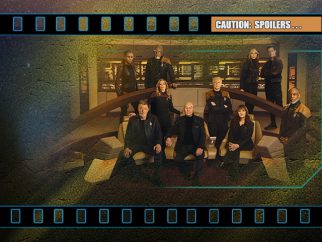
- Story8
- Acting9
- Direction9
- Production Design / VFX9
- Nostalgia factor10

